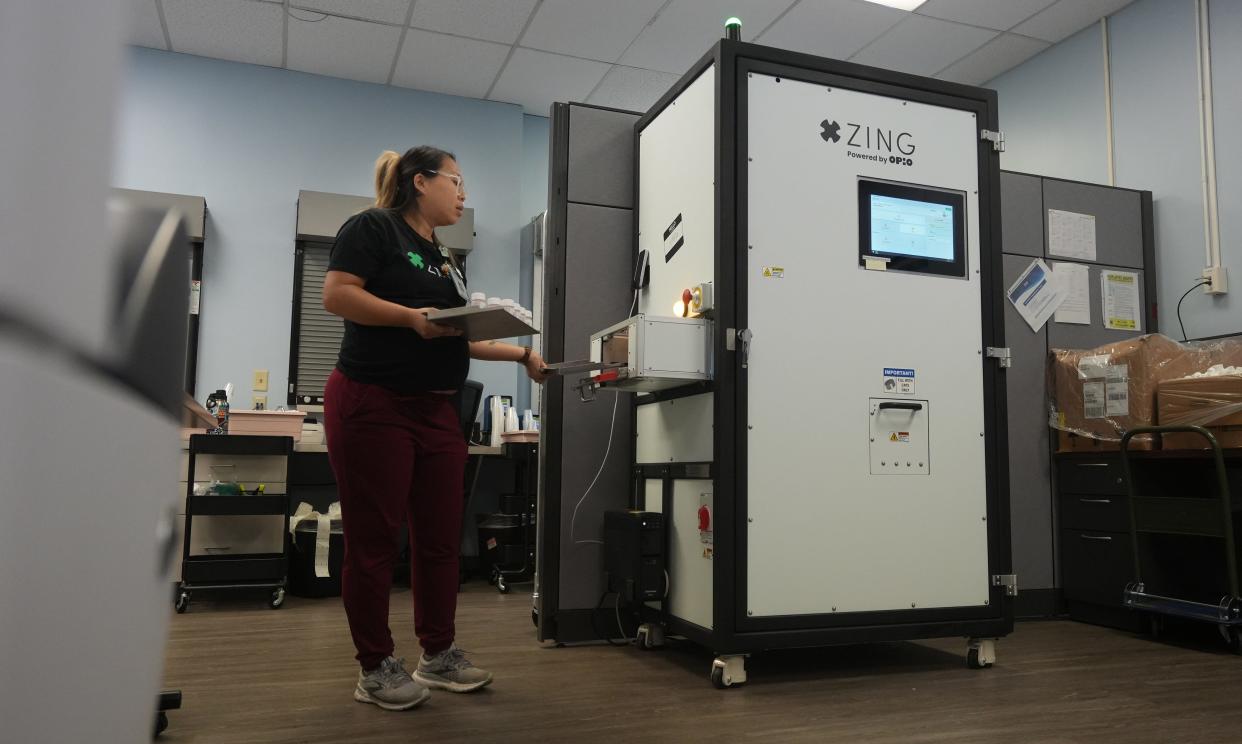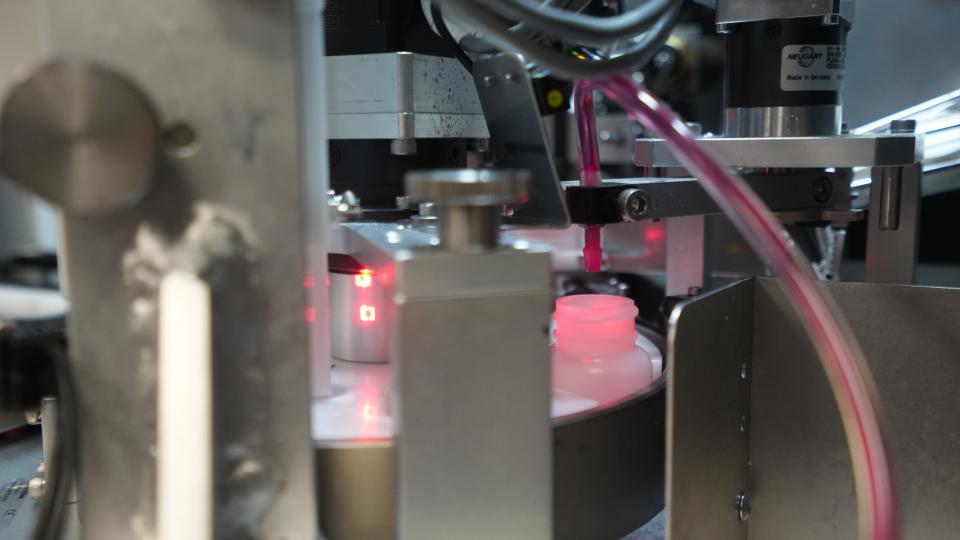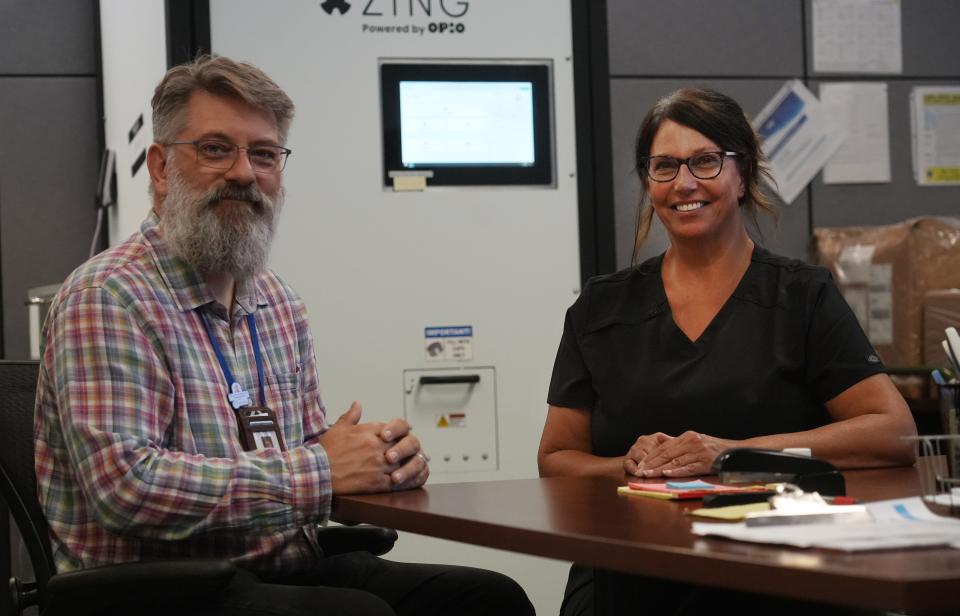Columbus' CompDrug opioid addiction program first to test 'revolutionary' machine

Siv Mao's wrists used to get sore as she twisted lids onto bottle after bottle of methadone each day at work.
She'd sit behind a window as patients came up, trying to chat with them and see how they were doing, while also focusing on measuring doses into bottles, printing and attaching labels, heat-sealing them and double-checking her work.
Now, Mao, a registered nurse at CompDrug, an opioid treatment program on the North Side, gets to take more time to talk to the patients she sees nearly every day. Her wrist doesn't hurt anymore, and she can even leave her chair throughout the day, something that was harder before a new machine arrived onsite in June.
"I never knew this even existed," Mao said of Opio's Zing robot, which now sits behind her in the nurse's station of CompDrug. "I love it."
About the size of a refrigerator, the machine assembles doses of methadone — for patients who are being treated for opioid use disorder — which nurses like Mao then dispense.
"It allows patient interactions," Mao said. "It decreases human error."
From her chair at the window, Mao can use software to order the amount of doses she needs — up to 54, depending on the patient and their treatment plan — and then it pumps methadone into bottles, caps the bottles and labels them. The bottles pop out of the machine on a tray, and then she uses a wand to heat-seal the caps with foil, a step that may soon be done within Zing as well, before double-checking and dispensing them.
More: 'She's my angel' Franklin County Drug Court graduate says h.a.r.t. program saves lives
Making history
CompDrug is the first program of its kind to try the new machine, as part of beta testing by Montana-based treatment technology company Opio. It can assemble over 1,000 doses per day.
"We're coming out of the shadows through CompDrug," said Mike Pokorny, co-founder and vice president of engineering at Opio.
The partnership began at an industry conference in November, when Dustin Mets, CEO of CompDrug, met Opio's team and learned about the machine. At the time, Mets remembers feeling bad that he and his team dominated Opio's time.

But Pokorny said it was Mets' adamancy about Zing being the right fit for CompDrug that ended up making the partnership happen.
After the Opio team visited CompDrug in January, they realized it was the right spot for the first Zing machine, Pokorny said.
"It's cohesive," he said of the CompDrug team and the culture where he said every voice is heard. "It's warm."
The "pressure testing" of Zing in a real environment where it would be used is allowing Opio's team to polish the product for other clinics in the country, Pokorny said.
There are five other opioid treatment programs lined up to get the Wisconsin-manufactured machine soon, from Baltimore to San Diego.
Columbus Conversations: "What is the state of the opioid crisis in our community?"
To 'help nurses be nurses'
The machine has decreased the amount of nurses needed at the window to greet patients each day, said Tawnya Tucker, director of nursing at CompDrug, who hopes the machine will mean more nurses can lead health education groups for patients.
That's an important change considering the current nursing shortage.

About 94% of surveyed registered nurses said there is a "severe or moderate shortage of nurses in their area," according to a 2023 survey of over 18,000 nurses by AMN Healthcare, a healthcare staffing company.
And they only expect it to get worse.
Opio's mission is to allow opioid treatment programs to reach smaller communities, Pokorny said, and the company hopes Zing can help make that happen.
"There's patients in virtually every community in the country," he said, but cost and the shortage of nurses prevent treatment programs from going everywhere. "This is the first stepping stone."
Opio was founded in January 2021 by Pokorny and Amber Norbeck, after they realized that there were areas of Montana where it was hard for programs to extend their services. In the whole state, there are only four programs, putting the onus on the patient to get to their medication, something Opio wants to change.
"It takes technology to do that," Pokorny said. "The machine adds flexibility and different workflow."
Nurses also reported high levels of stress in the AMN survey, with four out of five saying they experience a lot or a great deal of stress. More nurses answered the 2023 survey saying they worry about their job affecting their health and feel emotionally drained than in the 2021 survey.
It's hard, Mets said, because nurses can't mess up the dosing of methadone and labeling, but they also need to be diligently paying attention to the patient on the other side of the window. Both are life and death, he said.
"It's stressful because you're constantly having to context switch between the two," Mets said.
Due to the stigma around addiction, there hasn't been much innovation in the opioid treatment space, Mets said.
So, Zing is "revolutionary."
"I would totally recommend (other opioid treatment programs) bring Zing in to help with workforce, help with patient satisfaction," he said. "To help nurses be nurses."
dking@dispatch.com
@DanaeKing
This article originally appeared on The Columbus Dispatch: Columbus opioid addiction treatment program first to test new machine

